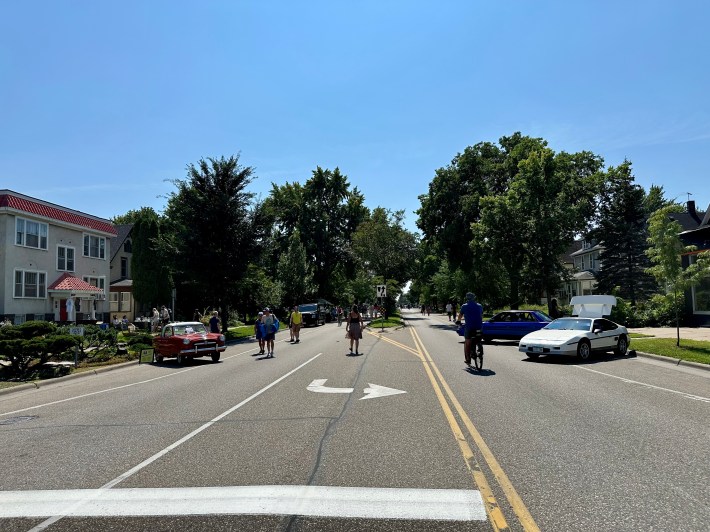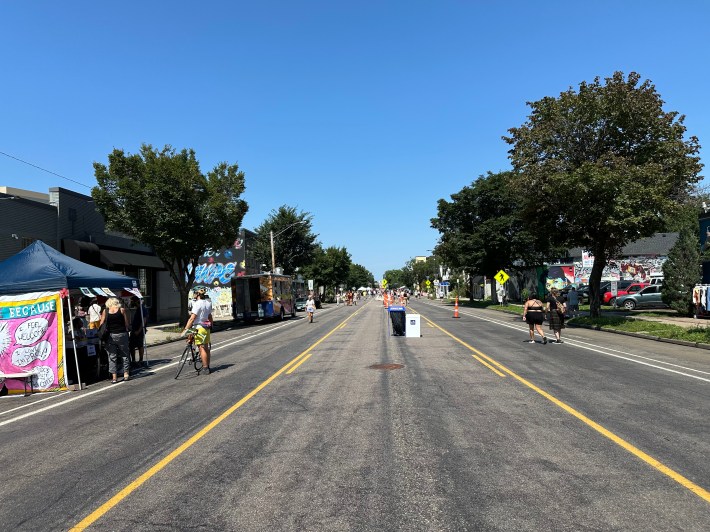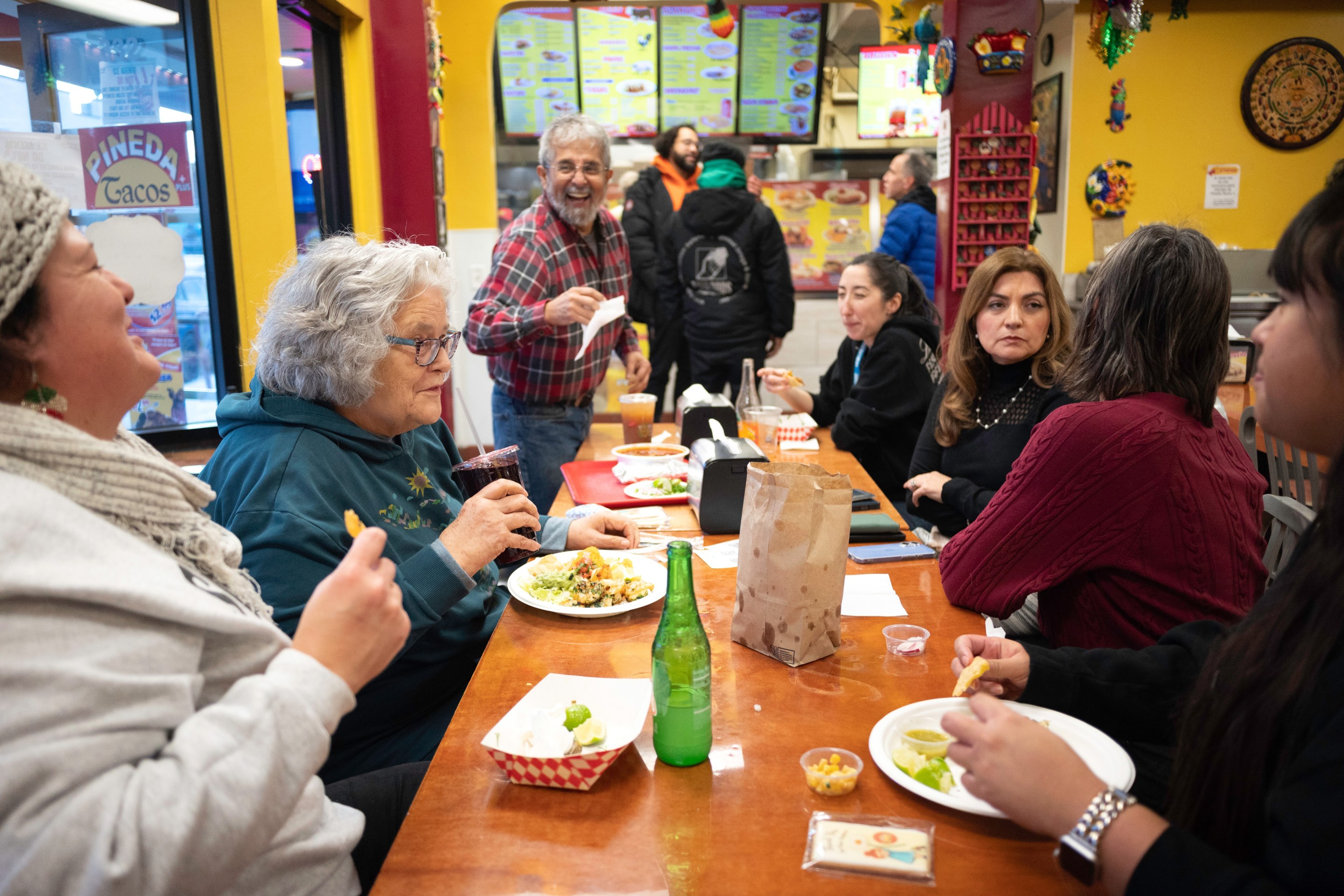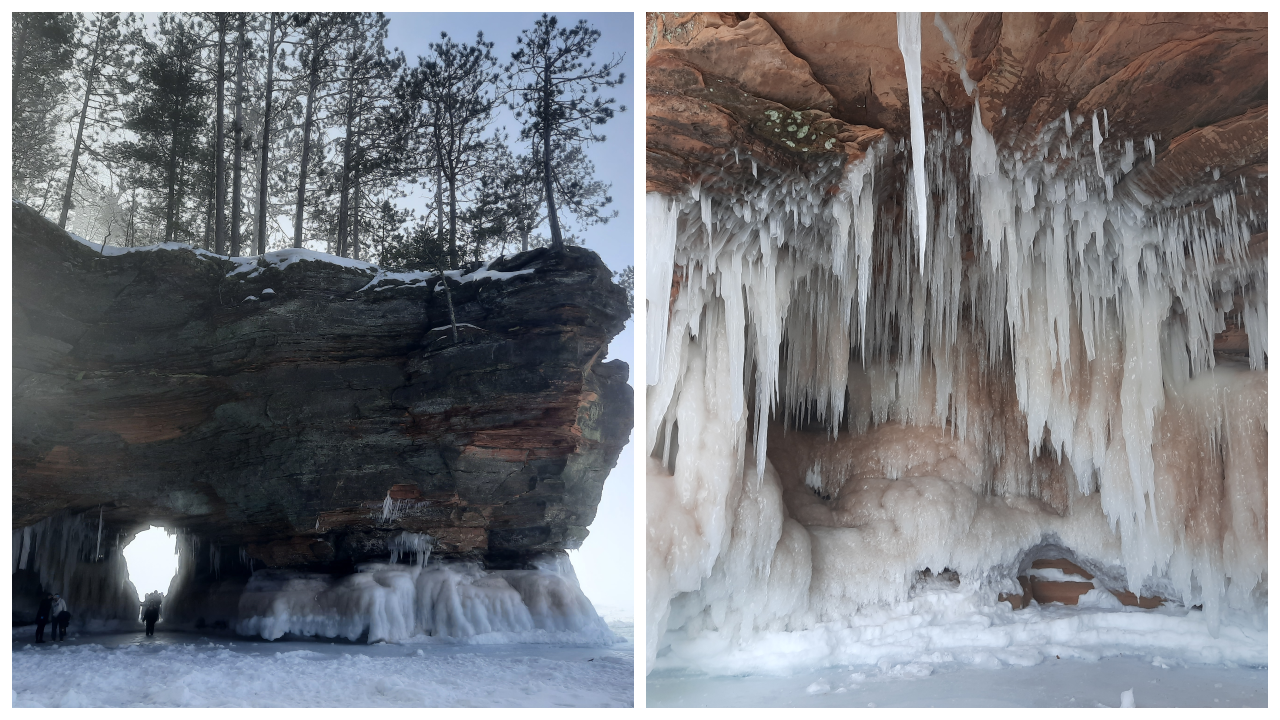If you hopped on your bike and hit Lyndale Open Streets this weekend, the first thing you may have noticed is that it felt much more sparsely attended than usual.
In the past, “We’d get complaints from people after the event of not being able to bike through comfortably because it’s too crowded,” said José Antonio Zayas Cabán, executive director of Our Streets. That was not a problem on Saturday in south Minneapolis, with cyclists comfortably weaving through the gathering. “I guess that’s my measuring stick—you can bike through," he adds.
Sure, there was live music, and F1rst Wrestling brought high-flying, chest-chopping action to Up-Down. You just didn’t have to navigate any crowds to watch. “It’s like Open Streets Lite,” Zayas Cabán continued, taking stock of the folks assembled at Lyn-Lake.
That could be due to any number of factors: the heat, perhaps, or the confounding decision to host the year’s first Open Streets to coincide with the first weekend of the Minnesota State Fair. Several people noted that promotion seemed lacking, that they found out about it just days before the event.
Is it just me or has Open Streets, specifically Lyndale, not been advertised at all this year? I live right there and didn't realize it was this Saturday until I saw a sign about the road closures yesterday...
— Audrey Kennedy (@_AudreyKennedy) August 19, 2024
Or it could be the fact that this year, for the first time in its history, the event was not hosted by Our Streets, the Minneapolis-based transportation advocacy nonprofit that founded Open Streets in 2011. After running the series for the last 12 years, Our Streets and the city of Minneapolis parted ways earlier this year—not exactly amicably—and the city sought new organizers.
This Saturday was our first glimpse at what an Our Streets-less Open Streets (this edition was organized by the Uptown Association) would look like. So we asked the org’s executive director if he’d stroll down Lyndale that afternoon, taking in the sights on the truncated route from 36th to 22nd Street, and he agreed.
Zayas Cabán was reminded of photos of the “OG Open Streets” events back in the early 2010s, which had fewer vendors and welcomed smaller crowds. At the Our Streets-hosted edition of Lyndale Open Streets in 2023 they welcomed about 320 vendors; there were just over 200 this past Saturday.
Sadly, the furries will be choosing not to attend the "open streets" event this weekend on Lyndale Avenue. The progressive vision of the festival made it worth going, but now it is literally just a car show with food trucks on a closed street.
— Solvi 🔜 FM (@SolviLynx) August 22, 2024
Previous festivals pictured pic.twitter.com/7e57RBxr3C
Some of the vendors, he noted, appeared to be in the same place they were last year, which made it seem like they’d wisely worked off an existing map. And there were plenty of food trucks positioned from block to block, though we didn’t notice any water bottle refill stations.
“The water isn’t there—this is a very technical thing, but on a hot day, we’re thinking about that,” Zayas Cabán said as muggy tempts crept toward 90 degrees. “And also, the police are patrolling in their vehicles. Which actually I do find pretty annoying.” (In prior years, they’d patrolled in smaller carts or on foot.)
And speaking of cars: We had planned to meet at the car show, which had been the subject of much online chatter leading up to Open Streets. A celebration of cars at an event that began as a protest against car culture and a reclamation of space for bicycles and pedestrians? This, we had to see.
But I biked right past it before realizing I was already at the “car show”—just three autos were parked near 34th & Lyndale, one of which was a ’91 Camry. Not exactly the collection of classic cars we’d expected. "The car show’s small enough that you don’t really feel it as a thing,” Zayas Cabán chuckled.

Maybe even classic car collectors wondered why they’d bring a vehicle to Open Streets, but these are the consequences of having the event run by a business coalition like The Uptown Association, which has different goals than Our Streets. The former opposed plans to eliminate parking in favor of bike lanes and improved public transit; the latter promotes an ambitiously progressive vision of inspiring a citywide movement toward fully pedestrianized corridors.
And Zayas Cabán wondered what future Open Streets events—there are two more planned this year, on West Broadway and Nicollet Avenue—will look like compared to this one, which is well known, typically well attended, and located in a densely populated section of the city that’s already a destination.
“Lyndale, in a way, takes care of itself,” he said, noting that the exciting work was getting folks out to West Broadway, or making Open Streets' Cedar-Riverside edition a success. “That’s where our work paid off.”
For a few years now, the organization had been shifting Open Streets programming to be more representative of the community in which it was hosted. Each was increasingly made up of vendors, artists, and makers located as close as possible to the corridor, with an ultimate vision of hosting Open Streets in every ward.
I know it just started half an hour ago, but I’ve literally never seen such an empty Open Streets event. pic.twitter.com/VCeDKMeTtm
— Nick Harper (@nharpermn) August 24, 2024
“We’d started thinking about things like removing the financial barrier to register for the event,” Zayas Cabán said. “What really, actually breaks my heart is not being able to do it in places where there are no resources but that are just as vibrant. That’s the direction we wanted to take it in.”
And Our Streets had been shifting its focus beyond Open Streets, toward big-picture issues like highway removal. There was an increased focus on the intersection of race and class in urbanism, on the ways gentrification and displacement are tied in with infrastructural changes. Ultimately, they wanted to emphasize a more integrated approach to advocacy.
At Open Streets in the past, Our Streets always included a giant section of information about things like universal street design and the impacts of living along highways. There was a mobile history museum, and there was plenty of information on the ways people could get involved after the event, if they were interested.

“You can do it in such a way where you engage with these ideas, and you still get good music, and you still get awesome food,” Zayas Cabán continued. Now, there’s a question of, “What are we trying to do with this?”
He referred to the Chico Mendes quote “environmentalism without class struggle is just gardening,” stating: “Open Streets without social, class, and race intersection awareness is just a festival.”
And while it's good that Minneapolis still has events that close the streets to cars, Minneapolis deserves for those events to be more than just another glorified art market—something it has plenty of already.
“Hopefully,” Zayas Cabán adds, “we’ll get the chance to do it again sometime in the future.”







